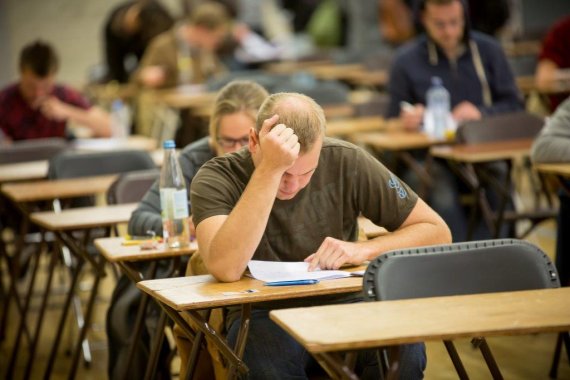The tests are good, but students do complain about overuse of group work and multiple choice questions. This was noted by the visitation committees that assessed Wageningen degree programmes in recent months.
Over the past months, 42 out of Wageningen’s 49 Bachelor’s and Master’s programmes were assessed by an external committee; the others had been assessed previously. The Wageningen programmes conducted a self-evaluation, students analysed each programme’s strengths and weaknesses, and the committee reached its judgement on the quality of the programmes on the basis of interviews. A broad consensus on sore points emerged, including the limited monitoring of exams.
Group work
Education director Arnold Bregt thinks WUR needs a two-yearly road test. ‘To stick with the road test metaphor: our fleet of cars is great, but the quality control leaves room for improvement.’ The exams currently get road-tested every four or five years. Bregt: ‘Students on several programmes indicated that they get too many multiple choice questions or an awful lot of assessments based on group work, which meant they could not always show what they are capable of.’
Free choice
The students’ appreciation of the free choice they have and the quality of the teachers was undiminished. ‘We have a highly motivated staff, with a lot of passion and enthusiasm for education, and we have study advisors who are very important for enabling students to chart their own degree paths,’ says Bregt. ‘The teachers are still available, even though students can see they are working themselves into the ground.’
But Bernadette Dijksma, who accompanied most of the visitations in her capacity as policy officer at Education & Student Affairs, notes that the quality is under pressure from the growth in student numbers, especially in courses involving practicals and field trips. Teachers and students are feeling the rub there, as chair groups can only adequately supervise groups of a limited size.
And then there is another issue affecting Wageningen Master’s programmes. These get a lot of students coming in from other Dutch or foreign universities, and Wageningen programmes in other disciplines. All these students start together, with varied levels of knowledge, language and writing skills, and learning styles. ‘Some students find the introductory courses too easy, and others find them too hard,’ says Bregt. The visitation committee therefore recommends sharpening up the admissions criteria for the Master’s programmes.
Self-test
Bregt thinks the screening is fine as it is, and is considering a different solution. ‘We could maybe offer students new to the university or the subject a self-test so they can find out how far they are in terms of their knowledge base, language and reflection. Based on that, they can catch up through some individual learning, in the form of a MOOC, for instance.’
Small-scale education
The visitation reinforced the education director’s conviction that WUR should hold on to its approach of personal, small-scale education. To this end, the university is investing an additional 43 million euros in the next five years to help cope with the growth. Bregt is not suggesting major adjustments. ‘All the programmes are continuously working on small changes. That’s what makes us so good.’

 Photo: Sven Menschel
Photo: Sven Menschel